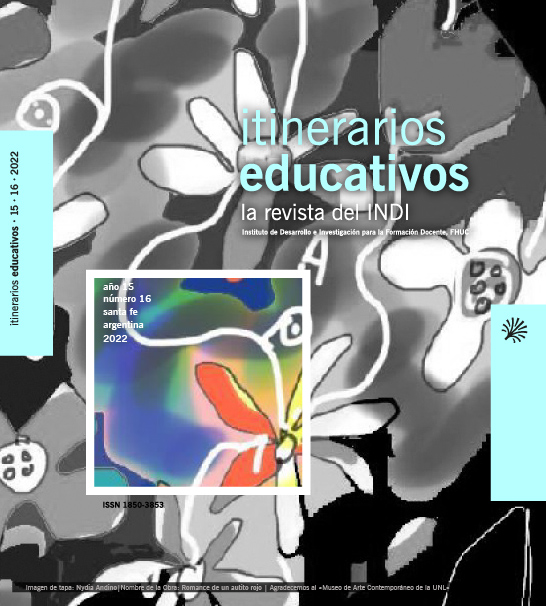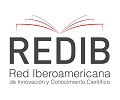Las lenguas extranjeras en la Facultad de Ciencias de la Educación de la Universidad Nacional de Entre Ríos (1984–2018)
DOI:
https://doi.org/10.14409/ie.2022.16.e0021Palabras clave:
lenguas extranjeras, currículos, didáctica de las lenguas, universidadResumen
Este artículo se centra en los aspectos principales del trabajo de tesis realizado para la obtención del título de Magister en Docencia Universitaria en la Facultad de Ciencias de la Educación de la Universidad Nacional de Entre Ríos. Primeramente, se introducen las preguntas iniciales en torno de la enseñanza de lenguas extranjeras —francés e inglés— en la Facultad junto con el tema y los objetivos de la tesis. Luego, se destacan algunos supuestos teóricos y aspectos prácticos del trabajo de investigación relativos al abordaje metodológico. Finalmente, se explora la relación entre los planes de estudios y programas de cátedra arribando a algunas conclusiones sobre la naturaleza del proceso de toma de decisiones en la enseñanza de idiomas en la universidad.
Citas
Bein, R. (2012). La política lingüística respecto de las lenguas extranjeras en la Argentina a partir de 1993. Argentina: Tesis Doctoral, Universität Wien.
Bonadeo, F. (2016). Diálogos, tensiones y criterios en la construcción de una Didáctica Específica para la formación docente en inglés. Tesis de la Maestría en Didácticas Específicas’, Facultad de Humanidades y Ciencias, UNL. Dirigida por la Dra. Victoria Baraldi y codirigida por la Dra. Mónica Gandolfo. Recuperado de http://bibliotecavirtual.unl.edu.ar:8080/tesis/handle/11185/575
Buckingham, D. (2008) Más allá de la tecnología. Buenos Aires: Manantial.
Camilloni, A. (2016). «Tendencias y formatos en el currículo universitario». Itinerarios educativos 9, Revista Anual del Instituto de Desarrollo e Investigación para la Formación Docente de la Facultad de Humanidades y Ciencia, UNL (pp. 59–87). Santa Fe: Ediciones UNL. Recuperado de
https://bibliotecavirtual.unl.edu.ar/publicaciones/index.php/Itinerarios/issue/view/610
Canteros, A. (2003). «Reflexiones en torno de la naturaleza de la didáctica de las lenguas extranjeras». Dorronzoro, M.I. et al. (comp.). Enseñanza de lenguas extranjeras en el Nivel Superior (pp. 115–118). Actas de las IX Jornadas de Enseñanza de Lenguas Extranjeras del Nivel Superior, Facultad de Filosofía y Letras, UBA 2003. Buenos Aires: Araucaria editora.
De Alba, A. (1991). Currículum: crisis, mito y perspectivas. México: Universidad Autónoma de México.
Galisson, R. (1994). «Formation à la recherche en didactologie des langues–cultures». Éla Revue de Didactologie des langues–cultures. Número special 95, Juillet–Septembre 1994 (pp. 119–159). París: Didier Education.
Gassó, L. (2001) coord. Diseño curricular de Lenguas Extranjeras. CABA: Gobierno de la Ciudad Autónoma de Buenos Aires, Akian Grafica Editora SA.
Guber, R. (2004). El salvaje metropolitano. Reconstrucción del conocimiento social en el trabajo de campo. Buenos Aires: Paidós.
Klett, E. (dir.) (2005). «La relación lengua materna/lengua extranjera: aspectos didácticos y psicolingüísticos». Didáctica de las lenguas extranjeras: una agenda actual (pp. 51–69). Buenos Aires: Araucaria.
Klett, E. (2007). «Lecture–compréhension en Fle à l'université: un parcours de cinquante ansen». Ela. Études de linguistique appliquée 2007/4 N° 148 | (pp. 437–445). Recuperado de https://www.cairn.info/revue-ela-2007-4-page-437.htm
Kumaravadivelu, B. (2003a). «Critical Language Pedagogy. A postmethod perspective on English language teaching» en World Englishes, Vol. 22, Nº 4 (pp. 539–550). UK: Blackwell Publishing Ltd. Oxford.
Kumaravadivelu, B. (2003b) Beyond methods: macrostrategies for language teaching. USA: Yale University Press.
Littlewood, W. (2013). «Developing a Context–Sensitive Pedagogy for Communication-Oriented Language Teaching». Teaching English. Recuperado de https://pdfs.semanticscholar.org/9eee/a0bc95a5db6f238516fba493de0cd2c67e53.pdf?_ga=2.99874716.36994175.1600557824-1866280771.1600557824
Narvaja De Arnoux, E. (2000). «La glotopolítica: transformaciones de un campo disciplinario». Primer Simposio en la Maestría en Ciencia del Lenguaje. Instituto Superior Joaquín V. González, Buenos Aires. Recuperado de http://www.academia.edu/24563971/La_Glotopol%C3%ADtica_transformaciones_de_un_campo_disciplinario
Nunan, D. (2004). Task–Based Language Teaching. UK: Cambridge University Press.
Piscitelli, A. (2010). Post–Gutenberg es Pre–Gutenberg. Quinientos años de textualidad son suficientes. Recuperado de http://www.filosofitis.com.ar/
Richards, J. (2006) Communicative Language Teaching Today. Cambridge: Cambridge University Press.
Richards, J.; Rodgers, T. (1999). Approaches and Methods in Language Teaching. Fifteenth Edition. Cambridge Language Teaching Library. London: Cambridge University Press.
Rigal, L.; Sirvent, M. T. (2017). Metodología de la Investigación Social y Educativa. Diferentes caminos de producción de conocimiento, Capítulos I, III y IV. Manuscrito en proceso de revisión.
Taylor, S.J.; Bogdan, R. (1987). Introducción a los métodos cualitativos de investigación. Barcelona: Paidós.
Varela, L. (2014). «¿Hay una política lingüística en la Argentina?». Todavía Nº 32, Lenguas. Segundo semestre 2014 (pp. 43–49). Buenos Aires: Fundación OSDE. Recuperado de http://www.revistatodavia.com.ar/
Wilkins, D. (1976). Notional Syllabuses. Oxford: Oxford University Press,
Zarur Miranda, X. (2008). «Integración regional e internacionalización de la educación superior en América Latina y el caribe». Gazzola, A.L. y Axel Didriksson (ed.) Tendencias de la educación superior en América Latina y el caribe. IESALC, UNESCO. (pp. 179–240). Recuperado de http://flacso.redelivre.org.br/files/2012/08/753.pdf
Publicado
Cómo citar
Número
Sección
Licencia
Aviso de derechos de autor/a
Los autores que publican en esta revista están de acuerdo con los siguientes términos:
- Los autores conservan los derechos de autor y garantizan a la revista el derecho de ser la primera publicación del trabajo al igual que licenciado bajo una Creative Commons Attribution License que permite a otros compartir el trabajo con un reconocimiento de la autoría del trabajo y la publicación inicial en esta revista.
- Los autores pueden establecer por separado acuerdos adicionales para la distribución no exclusiva de la versión de la obra publicada en la revista (por ejemplo, situarlo en un repositorio institucional o publicarlo en un libro), con un reconocimiento de su publicación inicial en esta revista.
- Se permite y se anima a los autores a difundir sus trabajos electrónicamente (por ejemplo, en repositorios institucionales o en su propio sitio web) antes y durante el proceso de envío, ya que puede dar lugar a intercambios productivos, así como a una citación más temprana y mayor de los trabajos publicados (Véase The Effect of Open Access).












